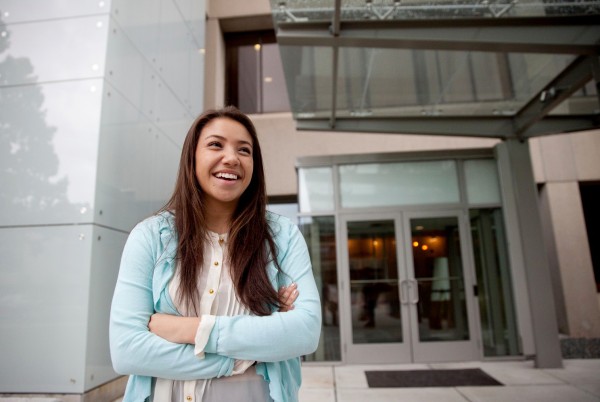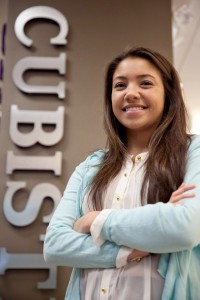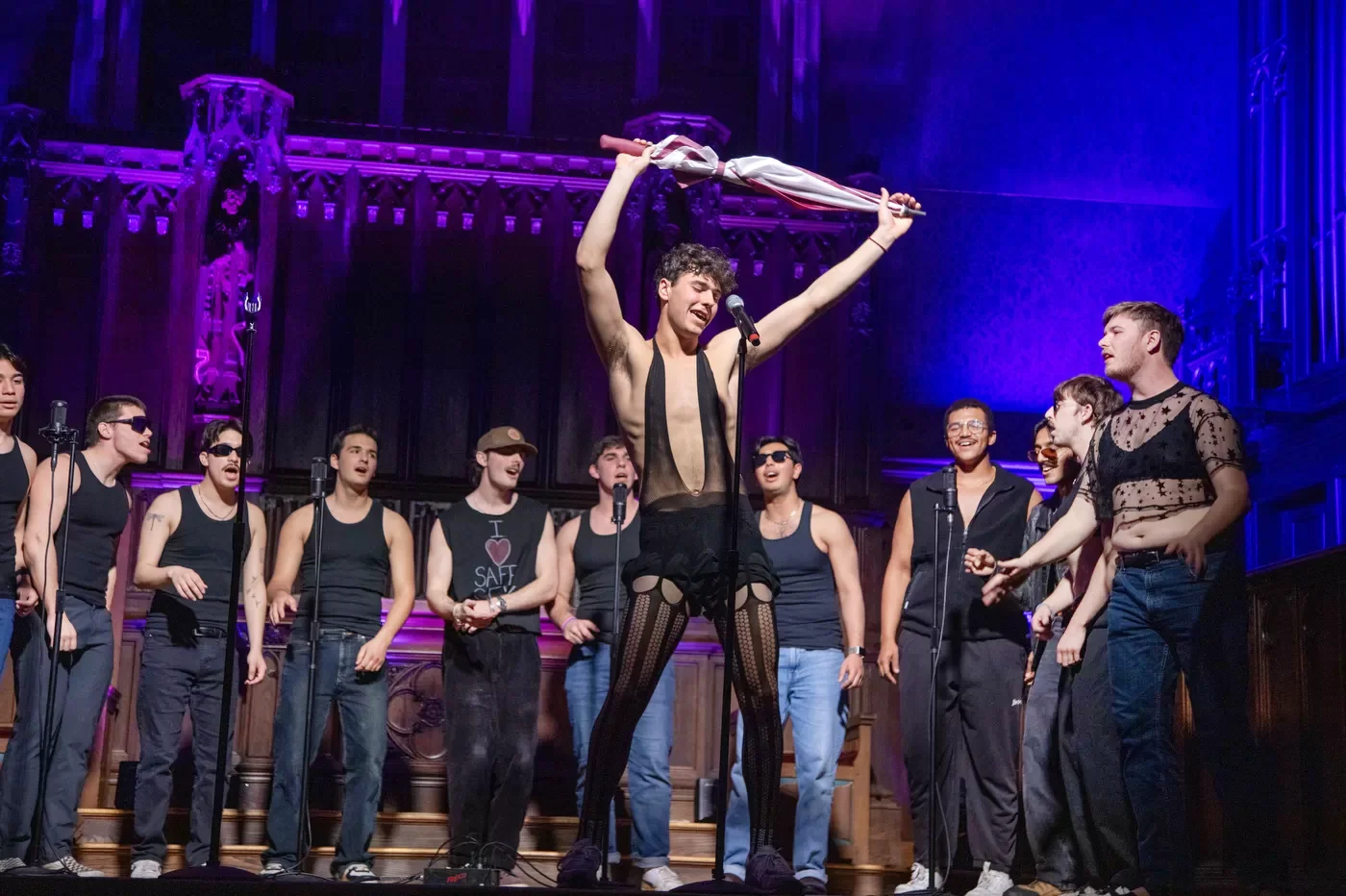
Summer Student Work: Ladd intern Sullivan ’15 finds a familiar work culture at Cubist
As a Ladd intern this summer, Shelby Sullivan ’15 contributed to the exacting work of drug development at Lexington, Mass.-based Cubist Pharmaceuticals, where Mike Bonney ’80 is CEO. Along the way, she discovered a work culture not unlike Bates’ own.
Name: Shelby Sullivan ’15
Hometown: Amesbury, Mass.
Major: Biology and English with a German language concentration
Internship Sponsor: The college’s Ladd Internship Program offers Bates-funded summer internships with for-profit and nonprofit businesses that often feature alumni networking opportunities.

Biology and English major Shelby Sullivan ’15 worked at Cubist Pharmaceuticals, based in Lexington, Mass., as a Ladd intern. (Phyllis Graber Jensen/Bates College)
1. What is your job?
I am an intern in clinical trial documentation, and I’ve been writing some of the appendices for two clinical study reports for Cubist drugs now in Phase 3 of their clinical trials. It’s taken up my whole summer, which is why they wanted an intern!
I’ve also created graphs and visuals to be part of the information being collected for the clinical studies.
2. What did you want from this internship?
Originally I was looking for an internship in a lab. But working in clinical trial documentation, at the very end of the drug-discovery process, means that I’ve learned the entire journey a drug takes from discovery to FDA inspection. It’s a big learning experience, about the industry itself as well as the hands-on biology and pharmaceutics.
3. Why did you pursue the Cubist internship?
The company was described as innovative and bold, and I thought that was cool. The company culture is welcoming, and everyone is extremely intelligent. The CSO [Chief Scientific Officer] says hello to me. Mike Bonney will talk to me. They don’t have an “I have no idea who that is” mentality.
It’s very much like Bates, open and welcoming, casual but professional, and the people are happy to be here.
3. Has the English major in you gotten a workout?
I didn’t think that I could incorporate biology and English, but the medical writing part of my internship has been huge. It’s a different side of English that I never thought would be useful. But the people on my team have a diverse set of college majors.
4. What has surprised you?
Without this internship, I don’t think I could ever grasp the incredible time and effort it takes to bring a drug to market.
5. What have you learned about the work world that you couldn’t have learned in a classroom?

“I always thought that my career would be in a lab doing research,” Sullivan says. “I realize now that there are so many different things I can do.” (Phyllis Graber Jensen/Bates College)
Meetings!
But I feel I’ve been opened up to the world. I’m using everything I learned in the classroom, almost physically.
This is also a good experience because I don’t think you sit in a classroom and say “I want to do this,” and then just go and do it. You have to get a feel for it in the actual environment. And I’ve gotten into the environment here. I’m thought of as part of the clinical operations team, and that’s cool.
6. How have you adjusted to real-world work?
By sticking to a schedule. I work from 7:30 to 3:30, which helps with traffic. I have to be organized, and I had to commit to not really having much of a summer.
It was relatively easy transitioning because I had so much work at Bates. But you learn to balance your time: work, dinner, gym, whatever. Being at Bates helps with that time management.
7. How is working in a Cubist cubicle?
Not that bad. The days go fast, and I enjoy it. You’re not stuck. Everything is going on around you; you can hear conversations, you go to meetings. Plus, it’s flexible here as long as you get your work done. I never think, “Ugh, I have to go to work.” I love it here.
8. What’s been most valuable?
I always thought that my career would be in a lab doing research. I realize now that there are so many different things I can do. I’ve been able to hear so many people talk about their niches at Cubist — clinical, discovery, finance, regulatory — and that has been a great learning opportunity.
9. Has the liberal arts perspective been valuable?
Absolutely. The interviewing process was long for this internship, and it was really helpful that Bates teaches you how to speak about your academic work and present information to a variety of people. I could go into a lab and understand what’s going on, or go into the finance department and grasp what they are discussing.
There are a lot of people who have advanced training specifically in pharmaceutics, but I don’t necessarily think they have more of an advantage. They are very specific about what they want to do and in some ways what they can do. They went to school to do that one thing, which is great for them if they know what that one thing is.
I have a sense that I can do more than one thing in a place like this.


